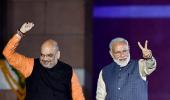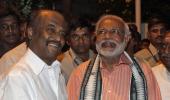'The feeling is that Rajinikanth is pro-Modi than anti-Modi.'
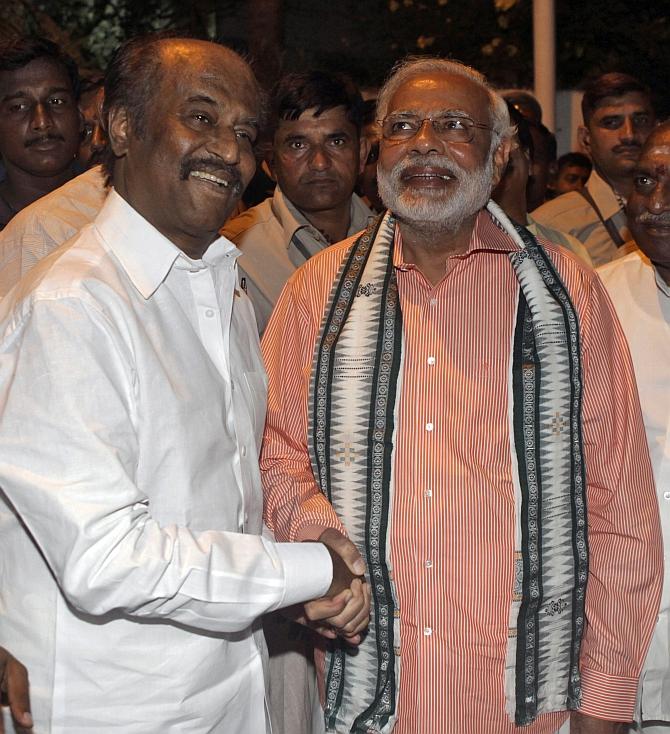
Rajnikanth said then he was a 'well-wisher' of Modi, while Modi, then the prime ministerial candidate, described the superstar as a 'good friend'.
The Lok Sabha election results, even while reaffirming the Bharatiya Janata Party's primacy in the country, showed that when it comes to South India, it is a different ball game altogether.
Barring Karnataka and Telangana, the other southern states showed the door firmly to the BJP, none more than Kerala and Tamil Nadu, two states where the ruling party hoped to do well.
Rajeeva Karandikar, director of the Chennai Mathematical Institute, is a well-known psephologist who predicted the Modi wave in 2014.
"The best bet for the BJP in Tamil Nadu is to prop up Rajinikanth first and then align with him," Dr Karandikar, below tells Rediff.com's Shobha Warrier.
When the north, east, central and north east voted for the BJP, the south barring Karnataka voted against the party.
Do you think the BJP is still perceived as a north Indian party and Modi is not accepted in this part of India?
A combination of all these factors worked against the BJP in the south. Historically, the BJP was perceived as a north Indian party from the Hindi belt, and these images will die only slowly.
Compared to 20 years ago, the acceptability of Narendra (Damodardas) Modi is more than what we would have expected, but still below that of other local leaders.
Let us take one by one. For example, Tamil Nadu.
The Lok Sabha election got intertwined with local issues. Some sections that did not want the BJP or Modi -- as they saw them as champions of Hindi -- voted against the BJP.
Then, NEET played a role for another section because politicians here conveyed that they didn't want NEET but the central government was imposing it on them.
Interestingly, Tamil Nadu has performed better than Maharashtra in the NEET exam this year.
Along with these, the internal problems of the AIADMK because of lack of leadership also played a role.
Did the vote against Modi happen only in Tamil Nadu, or did it happen in the other southern states too?
It was more in Tamil Nadu than in other states.
Do you think the BJP will be able to make inroads in Tamil Nadu any time soon with the Dravidian ideology so deep rooted here?
They have not been successful so far. Unless they try something very different, I don't think it will happen.
For the last couple of years, there has been a lot of talk about roping in Rajinikanth. He has now indicated that he will enter politics before the assembly elections.
But whether he actually does so is a question, and if he enters politics, what choices he will make, nobody knows.
The feeling is that Rajinikanth is pro-Modi than anti-Modi.
So, one possibility talked about by analysts is that he will join the AIADMK, a party with cadres and no leader and will become a de facto leader. He may then join hands with the BJP.
Do you see Rajinikanth joining the BJP?
That possibility was also discussed by many. But it is more likely that he will start his own party and ally with the AIADMK and also the BJP.
Once people accept this, he may move to the BJP. But it is highly unlikely that before testing the ground, he will join the BJP.
With no towering leader to guide the AIADMK, do you see the party withering away and the BJP taking its place against the DMK?
The possibility is there, but I don't see it as probable at this point. In a desperate situation, a large number of AIADMK cadres may switch to the DMK rather than go with the BJP.
The regional feeling is so strong that they need an umbrella of a regional party. For example, they can disintegrate and go to Rajinikath's party. That's quite possible.
The best bet for the BJP in Tamil Nadu is to prop up Rajinikanth first and then align with him.
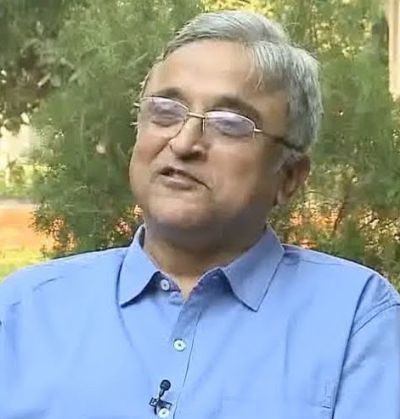
In 2014 when we spoke, you said that Kerala was a psephologist's nightmare as the margin of victory between the LDF and the UDF was always 1% to 2%. But this time, in most constituencies, the UDF won by a margin of 12%, which was unprecedented.
In Kerala, Sabarimala was the main issue that decided the poll results in support of the Congress. After the Supreme Court verdict, the CPI-M's aggressive posturing went against the party.
Curiously, when people decided that the Left Front should be defeated, they chose to vote for the UDF rather than the BJP because they thought the UDF had more chance of winning than the BJP.
Even those who supported the BJP and are moving towards the BJP voted for the Congress because they wanted the Left to be defeated.
In Kerala, the BJP was gaining support at the expense of the Left.
The upper crust of society that had been voting for the CPI-M were slowly moving towards the BJP. Even these people were very upset and angry with the CPI-M, but they went and voted for the Congress.
They felt a vote for the BJP might not defeat the CPI-M, but a vote for the Congress would defeat the CPI-M.
You see this kind of dynamics at certain times.
Some people vote because they like a party and some people vote because they want to defeat a party.
When you want to defeat a party, you look for a party which is more likely to defeat the party whether you like it or not.
So, you would say the vote was against the LDF rather than a vote for the UDF.
I think so.
Do you feel in the next assembly election, you may see a different pattern because it is going to be a three-cornered contest? Do you see the Hindus, who were moving from the CPI-M towards the BJP, would vote for the BJP?
Assembly election results can be different because voters may look for a winnable candidate, and it will be a smaller group compared to the Lok Sabha constituency.
If the BJP can portray winnability in some segments, it can pick up votes.
Yes, people do vote differently for the Lok Sabha and Vidhan Sabha. Local issues play a bigger role in the assembly election.
In Kerala, the UDF may have an upper hand, but they cannot expect a hands down victory that they got in the Lok Sabha election.
Do you see the BJP taking the place of the Left like it has happened in West Bengal?
It will take some more time.
In Bengal, people voted out the CPI-M because the anger against it was huge. Currently, anger against Didi (Mamata Banerjee) is also very strong.
In Kerala, neither the Left nor the Congress evoke the same strong reaction as yet.
At this point, I don't see the BJP taking the number two slot in Kerala. At least not in the next 2 or 3 years.
What about Andhra Pradesh and Telangana?
Both these states are neither pro-Modi or anti-Modi.
In these states, local issues decided the results completely. People voted keeping aside national issues and Modi.
Do you feel south India will continue to remain this way for some more time with the exception of Karnataka? Do you think regional parties will continue to dominate and the BJP will find it difficult to make inroads?
I think so. More so in Tamil Nadu than in Andhra and Telangana. In Andhra and Telangana, it has some presence.
Tamil Nadu will be the toughest nut for the BJP to crack.
Do you think the BJP will target Kerala first?
Yes, the next target could be Kerala. It is achievable if they have a 10-year timeframe, and not immediately.
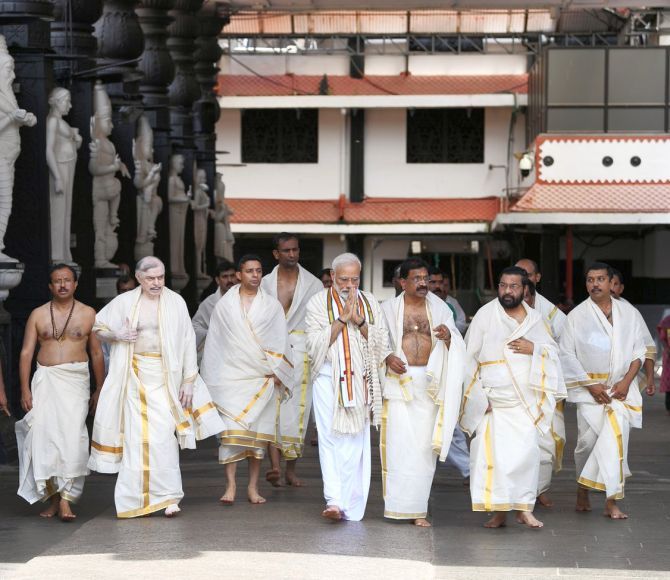
What we witnessed in 2019 was a Modi tsunami. Did you see this happening?
No, I didn't quite see a tsunami happening. In 2014, we saw a wave, as support for Modi kept increasing. This time, while there was a dip in January, by March it had reached the 2014 level.
So, there was no abrupt increase to call it a wave, but support for him was increasing.
By the time we went to the elections, it was clear that Modi would return as prime minister.
But the extent of victory was not anticipated, perhaps even by the party itself though they were talking about 300 plus.
What is the biggest takeaway from the 2019 election?
The biggest takeaway is while our country's governance system remains parliamentary, by and large voters saw it as a presidential election.
It was clearly a Modi victory, and not the victory of individual candidates.
Not even for the party?
Not even for the party. It was only for Modi.
Also, Modi and the BJP wanted it that way. I think the Opposition played into their hands as most of their campaign was constantly attacking Modi.
As they say in the advertising world, any publicity is good publicity. It is good as long as you remain in the limelight.
The Opposition could have performed better if they had spoken about what they planned to do. I had said in various forums in January and February that the Opposition had to name its prime ministerial candidate if they wanted to fight Modi, but many people questioned me then.
In several states like the entire Hindi belt, Maharashtra and Karnataka, the BJP polled more than 50% in the entire state.
In as many as 255 constituencies, the BJP won with more than 50% support. This is unprecedented.
Do you think rural India voting for Modi also is a takeaway this time?
Yes. The change that we saw was previously the village head would decide whom to vote for, and he would instruct the male members to do so. They in turn would ask the women and youngsters to do the same thing.
But this time, women and young people did not seem to listen to the head of the household and voted for whoever they wanted.
So, two important changes we saw were women coming out of the shackles of the community and household and voting the way they wanted.
The second is, the younger generation not necessarily conforming to the pattern.
Therefore, the impact of caste on election probably reduced.
Will this be confined to this election alone or do you see it as a permanent change in India?
I think we will see a change happening. I am hopeful.
Now we know that if there is a strong reason to vote against caste lines, they will do it.
The major reason for this change is because of the penetration of mobiles. Today, women in rural areas have a little more privacy in communication.
It is a lesson to people in politics that they can't just take voters for granted.
You said youngsters voted for Modi, but unemployment is the biggest problem India faces right now.
If Modi did not provide them with jobs as he promised, why did they vote for him? Is it because they still have hope in him?
It is more of a hope in him. Also, despondency that they did not expect the other guy to do any better.
It is also due to the failure of the other side to come up with any idea to tackle unemployment.
I think why the Opposition missed the bus was because, after the assembly election results in MP, Rajasthan and Chhattisgarh, if the Congress had chosen younger chief ministers, it would have sent a different message to people.
The criticism against the Modi government was that it was a government for the Ambanis and the Adanis, but rural India that voted for him overwhelmingly this time. How do you explain this?
The message that the Opposition wanted to give was that it was a government for big business. But the fact is people did not buy that at all.
What made the difference was Modi had a way of connecting with the masses which nobody else had.
Modi himself went around the country and addressed so many rallies. People saw him talk and believed in what he said.
The talk about corruption in the Rafale also did not have any impact on people. It was not clear what the Opposition was saying. Even to me, it was not clear.
Another fact is whatever you do, you have to take big business along. All the governments did so and there was no change in that aspect.
Rural women who got benefits like toilets and gas connections just ignored these barbs on corruption in Rafale and cosying with big business, and they voted for Modi.
